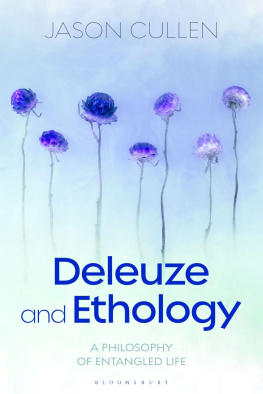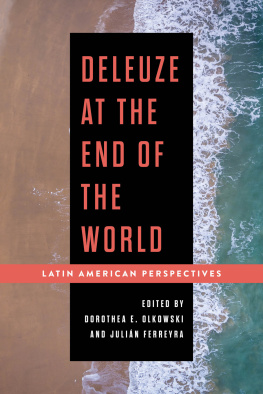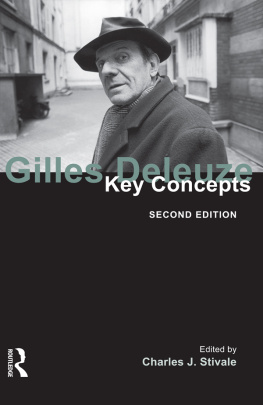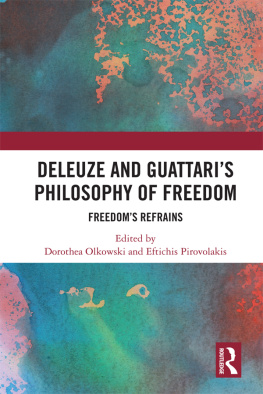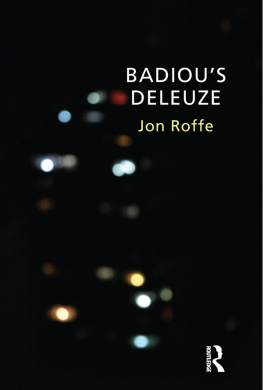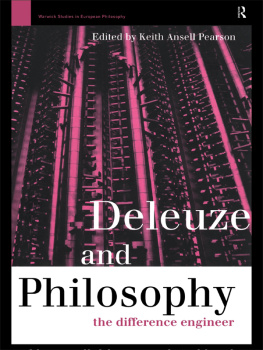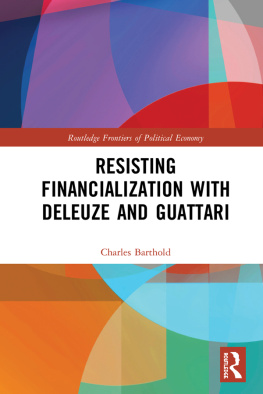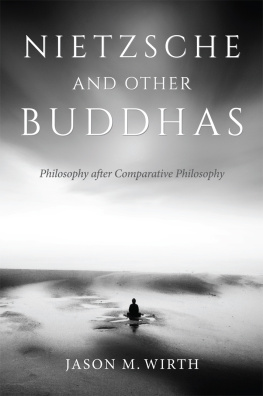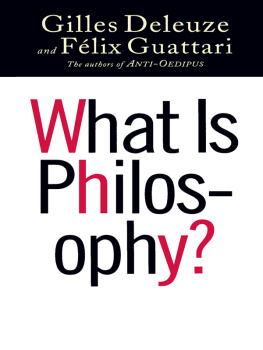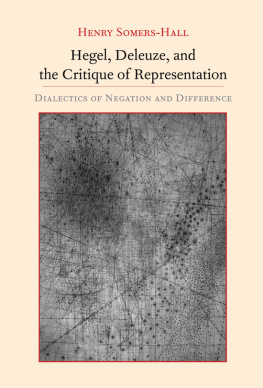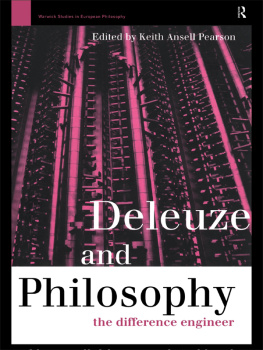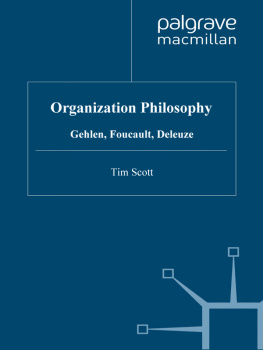Jason Cullen - Deleuze and Ethology: A Philosophy of Entangled Life
Here you can read online Jason Cullen - Deleuze and Ethology: A Philosophy of Entangled Life full text of the book (entire story) in english for free. Download pdf and epub, get meaning, cover and reviews about this ebook. year: 2020, publisher: Bloomsbury, genre: Religion. Description of the work, (preface) as well as reviews are available. Best literature library LitArk.com created for fans of good reading and offers a wide selection of genres:
Romance novel
Science fiction
Adventure
Detective
Science
History
Home and family
Prose
Art
Politics
Computer
Non-fiction
Religion
Business
Children
Humor
Choose a favorite category and find really read worthwhile books. Enjoy immersion in the world of imagination, feel the emotions of the characters or learn something new for yourself, make an fascinating discovery.
- Book:Deleuze and Ethology: A Philosophy of Entangled Life
- Author:
- Publisher:Bloomsbury
- Genre:
- Year:2020
- Rating:5 / 5
- Favourites:Add to favourites
- Your mark:
- 100
- 1
- 2
- 3
- 4
- 5
Deleuze and Ethology: A Philosophy of Entangled Life: summary, description and annotation
We offer to read an annotation, description, summary or preface (depends on what the author of the book "Deleuze and Ethology: A Philosophy of Entangled Life" wrote himself). If you haven't found the necessary information about the book — write in the comments, we will try to find it.
Deleuze and Ethology: A Philosophy of Entangled Life — read online for free the complete book (whole text) full work
Below is the text of the book, divided by pages. System saving the place of the last page read, allows you to conveniently read the book "Deleuze and Ethology: A Philosophy of Entangled Life" online for free, without having to search again every time where you left off. Put a bookmark, and you can go to the page where you finished reading at any time.
Font size:
Interval:
Bookmark:

Deleuze and Ethology
Also Available from Bloomsbury
Deleuze, Guattari, and the Problem of Transdisciplinarity , ed. Guillaume Collett
Deleuze and Guattari: Selected Writings , Kenneth Surin
Deleuze and the Schizoanalysis of Feminism , ed. Cheri Carr and Janae Sholtz
Space After Deleuze , Arun Saldanha
The History of Animals , Oxana Timofeeva
Deleuze and Ethology
A Philosophy of Entangled Life
Jason Cullen

Contents
Jakob von Uexklls functional cycle (Reproduced with permission of Minnesota University Press) |
Bergsons second great schema, Matter and Memory s famous cone with virtual circuits which contain all our past as [it] preserved in itself |
Bergsons first great schema, the circuits of memory and perception. Deleuze, Cinema 2 , 289; Bergson, Matire et mmoire , 109. |
Like many first books, Deleuze and Ethology began its life as a PhD thesis. In this case, it was a study of the metaphysical significance of Gilles Deleuzes two-volume Cinema project. While Deleuze and Ethology s transition from a PhD thesis to the present (hopefully improved) work has largely been a solitary passion project, there has been a handful of people who have aided its transformation: Greg Hainge, a supervisor who became a colleague and friend who has helped in many practical ways; Ronald Bogue and Greg Flaxman, my thesis examiners who offered unexpectedly generous encouragement to write this book as well as suggestions that have been key to its transformation; Lucy Russell at Bloomsbury who has been a kind guide through an unfamiliar process; and Jeff Moen at Minnesota University Press for granting permission to reproduce Uexklls functional cycle. And, of course, Yasmin Marysia for keeping me sane and motivated through the years of Deleuze and Ethology s production.
Deleuze once wrote that, even when working alone, one is never truly alone because we inhabit densely populated worlds. Of course, the world I inhabited while writing Deleuze and Ethology was populated by the philosophers and scholars who fill out this works bibliography, and many more besides. However, one of the most joyful aspects of writing this book has been the chance to reflect on the extent to which my world is shot through with connections to the worlds of myriad species and beings connections I might, unfortunately, ordinarily overlook. It was encounters with other species while bird-watching, to be precise and the sense that Deleuzes philosophy had something meaningful to say about how they negotiated their worlds that made me a Deleuzian. And, while working, it was the daily reminders that other beings simply going about their lives explicated Deleuze in startling ways that led to the transformative confrontation of ontology, ethics and ethology presented here. In this spirit, I would like to dedicate Deleuze and Ethology to the hope that philosophys current interaction with ethology leads to a new metaphysics a metaphysics whereby we embrace and prioritize our lives entanglements with the myriad worlds around us.
Citations of Spinozas Ethics are abbreviated in line with convention:
E | Ethics |
P | Proposition |
D | Demonstration |
S | Scholium |
C | Corollary |
A | Axiom |
Exp | Explanation |
Def | Definition |
L | Lemma |
Post | Postulate |
Pref | Preface |
App | Appendix |
Def Aff | Definition of Affects |
Roman numerals after E refer to one of the five parts of the Ethics , Arabic numerals refer to particular definitions, propositions, lemmas and so on. For example, EIP25S refers to Ethics , part one, proposition 25, scholium.
In Difference and Repetition , Gilles Deleuze articulated a logic of individuals as embedded and entangled in their environments and determined reciprocally with the ongoing transformations of the worlds that surround them. He argues that the conditions of an individuals genesis cannot be reduced to the capacities and powers that inhere in it, and to understand why an individual being is the particular individual that it is, we must attend to the movements, processes and relationships the kinetics of population that constitute its milieu. The aim of this book is to unpack the metaphysical logic of this view and to offer an interpretation of Deleuzes project as ethological. This description of Deleuzes project as an ethology has its origins in a problem that is at the heart of the work done by the only ethologist Deleuze explicitly cites in a significant way, Jakob von Uexkll. It is unfortunate that, while Deleuze cites Uexklls example of a ticks perception of its passing food, the full extent of Uexklls importance has not previously been discussed in commentaries on Deleuze, for, as I will argue here, in this example we find an early instance of a problem that animates much of Deleuzes philosophical project.
In a number of places in his oeuvre, Deleuze cites Uexklls most famous example, a tick and the way its orientation towards the world is defined by its affective capacities; however, I want to suggest that Deleuzes and Uexklls common ground is much richer than this one case. In his A Stroll through the Worlds of Animals and Men ,Uexkll explicates a long-standing model for thinking about the structure of an organisms interaction with its environment. In A Stroll , Uexkll deploys a motif he developed elsewhere and describes these interactions in musical terms, so that animals and their environments are conceived in terms of the melodies they produce together. To develop this theme more specifically, Uexkll offers a model, a functional circle, to capture the structure of these interactions with respect to the meaning and significance that organisms have for each other. It is on this point that Deleuze and Uexkll converge.
This is not to suggest that Uexkll directly inspired or influenced Deleuzes project, however. Even when ethology is mentioned in Deleuzes singularly authored works, it is hard not to wonder about the coincidence of these references with the timeline of Deleuzes collaborations with Flix Guattari who was more explicitly concerned with ecology and ethology. The first work published out of this decades-long collaboration was Anti-Oedipus in 1972, a work which was surely in its embryonic stages as Deleuze completed the first edition of Spinoza: Practical Philosophy (1970), where ethology and Uexkll are employed to describe Spinozas philosophy.Still, if we were to obsess over the extent to which Deleuze was likely aware of Uexklls work, we would miss an important point; even if Uexkll and ethology played a minor role in, or were absent from, Deleuzes early work, this insight regarding the structural reciprocity of subjective reflection and its object, as well as the virtual worlds produced in virtue of this reciprocity, is clearly at work at the heart of each thinkers philosophy. Even if Deleuze has not been significantly influenced by ethology or the life sciences more generally, there are certainly cases where it seems that the two could be brought into dialogue in productive ways. For instance, in Cinema 1: The Movement-Image , Deleuze critiques the idea of a grand, dialectical holism present in early twentieth-century Soviet cinema, and his critique would no doubt speak to the version of organicism pervasive in Soviet biology of the same era. Or, in a more modern context, it is not hard to imagine that an ontological theme that I will discuss in Deleuze and Ethology that virtual relational networks subsist in actual lives would speak fruitfully to the contemporary problematic of holobionts and hologenomes in evolutionary biology the idea that consortia consisting of organisms, and the microbial ecosystems that they host, constitute a single individual, and that their entanglements constitute a singular, individual genome. And so, by laying out this particular problem through the work of Jakob von Uexkll, I want to suggest that there is a structurally similar problem at work in Deleuzes philosophy. Moreover, because of the persistence of this problem regarding the way individuals are affectively entangled thanks to the meaning and significance they have for each other, and because of the light this casts on Deleuzes project, I want to suggest that we would best understand this as an ethological project.
Font size:
Interval:
Bookmark:
Similar books «Deleuze and Ethology: A Philosophy of Entangled Life»
Look at similar books to Deleuze and Ethology: A Philosophy of Entangled Life. We have selected literature similar in name and meaning in the hope of providing readers with more options to find new, interesting, not yet read works.
Discussion, reviews of the book Deleuze and Ethology: A Philosophy of Entangled Life and just readers' own opinions. Leave your comments, write what you think about the work, its meaning or the main characters. Specify what exactly you liked and what you didn't like, and why you think so.

